 This series continues the investigations that singularise Chagas’ work, namely the attention to the experiential and affective relationships that subjects establish with everyday objects and spaces, countering fast rhythms of consumption through a decelerated gaze that closely scrutinises discarded materials, shapes and textures. However, the series simultaneously marks a kind of turning point, insofar as, unlike previous series carried out in various urban public spaces to the North and South, vaguely identified (the streets and beaches of Luanda, Venice, London and Newport, etc.), in this series, for the first time, the photographer focused on the indoors and outdoors of a specific architecture.
This series continues the investigations that singularise Chagas’ work, namely the attention to the experiential and affective relationships that subjects establish with everyday objects and spaces, countering fast rhythms of consumption through a decelerated gaze that closely scrutinises discarded materials, shapes and textures. However, the series simultaneously marks a kind of turning point, insofar as, unlike previous series carried out in various urban public spaces to the North and South, vaguely identified (the streets and beaches of Luanda, Venice, London and Newport, etc.), in this series, for the first time, the photographer focused on the indoors and outdoors of a specific architecture.
I'll visit
29.09.2022 | by Ana Balona de Oliveira
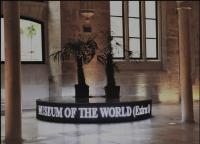 With this MEMOIRS project Newsletter, Nº 147, we conclude a journey started on May 5, 2018. To the
group of researchers of the project, to the dozens of external collaborators, to all the artists who
contributed with their images, to the producers and designers, the deep gratitude of the editors, who
are certain of two things: to have contributed to the sharing of a common good, knowledge, and to
have done so in the spirit of public service
With this MEMOIRS project Newsletter, Nº 147, we conclude a journey started on May 5, 2018. To the
group of researchers of the project, to the dozens of external collaborators, to all the artists who
contributed with their images, to the producers and designers, the deep gratitude of the editors, who
are certain of two things: to have contributed to the sharing of a common good, knowledge, and to
have done so in the spirit of public service
To read
17.01.2022 | by António Pinto Ribeiro
 In the contemporary discussions regarding post-colonial Europe, the concepts of memory and post- memory have taken on growing importance, giving prominence to an insight with great political relevance: colonialism never ends with those who enforced or suffered it. Traces of a colonial mindset impregnate generations to come and it has been passed down through the image of the former coloniser and the former colonised. These characters restage a complex phantasmagoria closely related to the most intimate ghost of the European subconscious: its colonial ghost which manifests itself inter alia in the form of a colonial “transfer of memory” – as racism, segregation, exclusion, subalternity – or in the form of “eruptions of memory”, and thereby questions the very essence of European multicultural societies, shaped by colonial heritage and fed by waves of migration.
In the contemporary discussions regarding post-colonial Europe, the concepts of memory and post- memory have taken on growing importance, giving prominence to an insight with great political relevance: colonialism never ends with those who enforced or suffered it. Traces of a colonial mindset impregnate generations to come and it has been passed down through the image of the former coloniser and the former colonised. These characters restage a complex phantasmagoria closely related to the most intimate ghost of the European subconscious: its colonial ghost which manifests itself inter alia in the form of a colonial “transfer of memory” – as racism, segregation, exclusion, subalternity – or in the form of “eruptions of memory”, and thereby questions the very essence of European multicultural societies, shaped by colonial heritage and fed by waves of migration.
To read
31.10.2021 | by Margarida Calafate Ribeiro
 Today, I think that the field is challenged more than ever by the increased volatility of debates about what nations remember and consequentially forget. Monuments and memorials are being vandalized, torn down, officially removed. They can no longer be seen as simply part of an historical landscape. Much of this can be understood as battles over the historical narratives of monuments and their power, but it is also about tensions around who the nation mourns and who it sees or does not see as having a “grievable life” in Judith Butler’s term. So I see memory activism as a key site for the production of memory scholarship.
Today, I think that the field is challenged more than ever by the increased volatility of debates about what nations remember and consequentially forget. Monuments and memorials are being vandalized, torn down, officially removed. They can no longer be seen as simply part of an historical landscape. Much of this can be understood as battles over the historical narratives of monuments and their power, but it is also about tensions around who the nation mourns and who it sees or does not see as having a “grievable life” in Judith Butler’s term. So I see memory activism as a key site for the production of memory scholarship.
Face to face
25.10.2021 | by Inês Beleza Barreiros
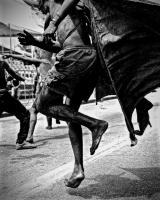 There is a present-day tendency to retreat into the realms of dystopia, of catastrophe and disaster, of failed states and fascism, of environmental collapse and economic apocalypse. This tendency is neither wrong nor mistaken. Yet it is often suffocating, only adding to the pressurized dread of the era, offering no antidote to the plague of cynicism, the chokehold of hopelessness, the drift, or, perhaps, the plunge, into a miasma of pessimism and hopelessness. Of course, there are other tendencies, other possibilities, other ways forward. Here, we briefly mention five recent books, loosely grouped under the banners of anarchism, autonomy, and utopia, that propose better worlds to come – as better must come.
There is a present-day tendency to retreat into the realms of dystopia, of catastrophe and disaster, of failed states and fascism, of environmental collapse and economic apocalypse. This tendency is neither wrong nor mistaken. Yet it is often suffocating, only adding to the pressurized dread of the era, offering no antidote to the plague of cynicism, the chokehold of hopelessness, the drift, or, perhaps, the plunge, into a miasma of pessimism and hopelessness. Of course, there are other tendencies, other possibilities, other ways forward. Here, we briefly mention five recent books, loosely grouped under the banners of anarchism, autonomy, and utopia, that propose better worlds to come – as better must come.
To read
18.03.2021 | by The Public Archive
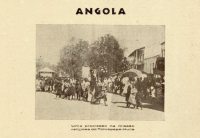 References to Portugal’s epic, seafaring past like these litter this city – there is even a Vasco da Gama shopping mall. But until now, there has never been a single explicit reference, memorial or monument in Portugal’s public space to its pioneering role in the transatlantic slave trade, nor any acknowledgement of the millions of lives that were stolen between the 15th and 19th centuries.
References to Portugal’s epic, seafaring past like these litter this city – there is even a Vasco da Gama shopping mall. But until now, there has never been a single explicit reference, memorial or monument in Portugal’s public space to its pioneering role in the transatlantic slave trade, nor any acknowledgement of the millions of lives that were stolen between the 15th and 19th centuries.
Games Without Borders
15.03.2021 | by Ana Naomi de Sousa
 The events of the past six years have sharpened Gilroy's observations. At the same time, they have made it increasingly clear that, despite the real progress achieved, attempts to maintain privileges based on structural and systemic inequality, whether in terms of class, gender or race, have become even more obstinate. Attempts that go hand in hand with the futile but devastating efforts to deny history and impose the erasure of memory.
The events of the past six years have sharpened Gilroy's observations. At the same time, they have made it increasingly clear that, despite the real progress achieved, attempts to maintain privileges based on structural and systemic inequality, whether in terms of class, gender or race, have become even more obstinate. Attempts that go hand in hand with the futile but devastating efforts to deny history and impose the erasure of memory.
To read
18.02.2021 | by Paulo de Medeiros
 In the face of this new narrative that acknowledges artistic production and an appreciation of it by African communities, how do secular cultural traditions of African countries interact today with artistic training and production, in the case of Afrodescendant artists, who were born and raised in European countries? How do events in the history of Africa and Africans combine with the artistic languages of the "European schools" and, in particular, with contemporary themes?
In the face of this new narrative that acknowledges artistic production and an appreciation of it by African communities, how do secular cultural traditions of African countries interact today with artistic training and production, in the case of Afrodescendant artists, who were born and raised in European countries? How do events in the history of Africa and Africans combine with the artistic languages of the "European schools" and, in particular, with contemporary themes?
To read
28.12.2020 | by António Pinto Ribeiro
 AbstractSince this is a matter that is not yet resolved, where the strength of ideologies and re-uses may change deeply or even reverse the ways it is evoked, the colonial past may become a problem (Vecchi, 2018a). This is the case of Portuguese colonialism which is frequently invoked to stress resentments: whether from the country that was colonised or the colonising country (Ferro, 2009). As soon as the Portuguese Revolution of 25 April 1974 took place, Mozambique promoted the elimination of colonialism symbols. This predictable attitude, aiming to show that the colonisation had ended, was later amended by the future Governments, with the colonial stat-ues (at least, the ones that remained) being relocated to a place where they may be observed and contextualised. This action aimed to preserve the memory, which may enable the development of intercultural dynamics, softening the mentioned resentment: promoting questioning, in order to understand certain logics and, at the same time, filling gaps in the forgotten memory and in the Mozambican identity (Khan, Falconi & Krakowska, 2016). This paper refers to the cases related to the new life of two colonial statues in Maputo – Mouzinho de Albuquerque and Salazar –, during the post-colonial period and the permanence, until today, of the first monumental trace of Estado Novo [Second Republic] (Monumento aos Mortos da Primeira Guerra Mundial [World War I monument]), showing the importance that the preservation of memory has in a country or a na-tion’s life, even when it is associated with the former coloniser. This sort of mental decolonisation (Mbembe, 2017; Thiong’o, 1986), aims the questioning of the way the colonial past weighs on the current intercultural relations, in Mozambique, when the country establishes a relation with the former coloniser, allowing its inhabitants to look at the past as a way to build future dynamics.
AbstractSince this is a matter that is not yet resolved, where the strength of ideologies and re-uses may change deeply or even reverse the ways it is evoked, the colonial past may become a problem (Vecchi, 2018a). This is the case of Portuguese colonialism which is frequently invoked to stress resentments: whether from the country that was colonised or the colonising country (Ferro, 2009). As soon as the Portuguese Revolution of 25 April 1974 took place, Mozambique promoted the elimination of colonialism symbols. This predictable attitude, aiming to show that the colonisation had ended, was later amended by the future Governments, with the colonial stat-ues (at least, the ones that remained) being relocated to a place where they may be observed and contextualised. This action aimed to preserve the memory, which may enable the development of intercultural dynamics, softening the mentioned resentment: promoting questioning, in order to understand certain logics and, at the same time, filling gaps in the forgotten memory and in the Mozambican identity (Khan, Falconi & Krakowska, 2016). This paper refers to the cases related to the new life of two colonial statues in Maputo – Mouzinho de Albuquerque and Salazar –, during the post-colonial period and the permanence, until today, of the first monumental trace of Estado Novo [Second Republic] (Monumento aos Mortos da Primeira Guerra Mundial [World War I monument]), showing the importance that the preservation of memory has in a country or a na-tion’s life, even when it is associated with the former coloniser. This sort of mental decolonisation (Mbembe, 2017; Thiong’o, 1986), aims the questioning of the way the colonial past weighs on the current intercultural relations, in Mozambique, when the country establishes a relation with the former coloniser, allowing its inhabitants to look at the past as a way to build future dynamics.
City
13.12.2020 | by Vítor de Sousa
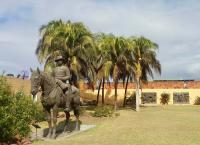 According to a government decision of the same year, Independence squares were to be set up in all provincial capitals and to receive identical but smaller statues produced in North Korea by Mansudae Art Studio: the statue erected in the capital is 9 meters high, while those implanted in other cities are 2.9 meters high.
According to a government decision of the same year, Independence squares were to be set up in all provincial capitals and to receive identical but smaller statues produced in North Korea by Mansudae Art Studio: the statue erected in the capital is 9 meters high, while those implanted in other cities are 2.9 meters high.
To read
11.06.2020 | by Roberto Conduru
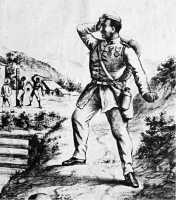 It would be a supreme fantasy to think, naively, that we can fully recognize the black blood that lies beneath the foundations of nation-empires and post-empires if we also leave in place the very stones that sustain and adorn the idea of the nation.
It would be a supreme fantasy to think, naively, that we can fully recognize the black blood that lies beneath the foundations of nation-empires and post-empires if we also leave in place the very stones that sustain and adorn the idea of the nation.
To read
28.01.2020 | by Bruno Sena Martins
 The mission of the EXCHANGE project (2015-2020) (2) is to reflect critically on the perpetuation of the “European dream” of a community of solidarity in which national, linguistic and cultural differences are overcome to produce a space in which citizens can move freely and safely. The surveillance technologies that the project studies have a shared feature: they are genetic machineries that seek to identify individuals for the purposes of criminal prosecution.
The mission of the EXCHANGE project (2015-2020) (2) is to reflect critically on the perpetuation of the “European dream” of a community of solidarity in which national, linguistic and cultural differences are overcome to produce a space in which citizens can move freely and safely. The surveillance technologies that the project studies have a shared feature: they are genetic machineries that seek to identify individuals for the purposes of criminal prosecution.
Games Without Borders
07.09.2019 | by Sheila Khan and Helena Machado
 Em Mais um Dia de Vida, encontramos uma estética hollywoodesca, de construção e celebração do herói Kapuscinski. Terá a mais valia de dar a conhecer a outros públicos (em particular ao mais jovem, pelo estilo de filme de ação) o xadrez político regional e internacional que se jogava em Angola. Porém, ao centrar a narrativa de forma tão redutora na figura do ‘herói jornalista’, o filme não responde à evocação de Carlota, ficando suspenso num jogo dúbio de uso (e abuso) da memória e do esquecimento.
Em Mais um Dia de Vida, encontramos uma estética hollywoodesca, de construção e celebração do herói Kapuscinski. Terá a mais valia de dar a conhecer a outros públicos (em particular ao mais jovem, pelo estilo de filme de ação) o xadrez político regional e internacional que se jogava em Angola. Porém, ao centrar a narrativa de forma tão redutora na figura do ‘herói jornalista’, o filme não responde à evocação de Carlota, ficando suspenso num jogo dúbio de uso (e abuso) da memória e do esquecimento.
Afroscreen
21.01.2019 | by Hélia Santos
 This reusing of the past requires us to reflect on how traumatic histories are collectively absorbed, and on how histories can be revised, even distorted, when they are reread. When the past is reused, its image is reinscribed through the prism of a particular, usually other, ideology with the intention of evoking a particular past and creating its counter image. This manoeuvre often has hegemonic ambitions, and aims to impact public opinion.
This reusing of the past requires us to reflect on how traumatic histories are collectively absorbed, and on how histories can be revised, even distorted, when they are reread. When the past is reused, its image is reinscribed through the prism of a particular, usually other, ideology with the intention of evoking a particular past and creating its counter image. This manoeuvre often has hegemonic ambitions, and aims to impact public opinion.
To read
02.01.2019 | by Roberto Vecchi
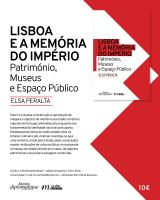 Its purpose is to analyse the several examples by which “images” related to the imperial history of Portugal are built and copied, thus being understood as a fundamental and articulating axis of the Portuguese national identity. The focus is therefore on a “image-memory” or a memory-representation, authorized by the State, by its corporation and by institutions of public culture and not so much on a memory-routine, passed on in the realm of daily social interactions, or a memory-remembrance, passed on verbally.
Its purpose is to analyse the several examples by which “images” related to the imperial history of Portugal are built and copied, thus being understood as a fundamental and articulating axis of the Portuguese national identity. The focus is therefore on a “image-memory” or a memory-representation, authorized by the State, by its corporation and by institutions of public culture and not so much on a memory-routine, passed on in the realm of daily social interactions, or a memory-remembrance, passed on verbally.
City
20.11.2018 | by Elsa Peralta
 When history and duties to memory are ignored, truth can easily be thought of as a personal choice. Once accommodated in powerful discourse, these “truths” assume impunity: often disregarded and rarely condemned, even though they represent hate speech. Hatred has been normalized and has propelled a radicalism in which “good” struggles against “evil.” In this dichotomy, evil is once again the ‘other’. A discourse that does not humanize the ‘other’ authorizes barbarism – as we have seen in the post-election reactions
When history and duties to memory are ignored, truth can easily be thought of as a personal choice. Once accommodated in powerful discourse, these “truths” assume impunity: often disregarded and rarely condemned, even though they represent hate speech. Hatred has been normalized and has propelled a radicalism in which “good” struggles against “evil.” In this dichotomy, evil is once again the ‘other’. A discourse that does not humanize the ‘other’ authorizes barbarism – as we have seen in the post-election reactions
To read
05.11.2018 | by Fernanda Vilar
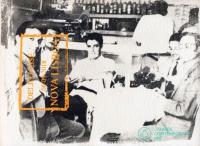 Taking these portraits as a starting point, what segregation does is to create contradictory sentiments between the delectable nostalgia of a privileged minority and the disavowal of a brutally exploited majority. All of history can be interpreted in multiple ways, like a work of art, and in Jasse’s work the myriad readings available to the observer are left open in an approach that is utterly unpretentious.
Taking these portraits as a starting point, what segregation does is to create contradictory sentiments between the delectable nostalgia of a privileged minority and the disavowal of a brutally exploited majority. All of history can be interpreted in multiple ways, like a work of art, and in Jasse’s work the myriad readings available to the observer are left open in an approach that is utterly unpretentious.
I'll visit
14.09.2018 | by Kiluanji Kia Henda
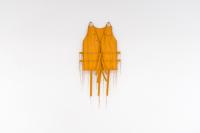 I said to one of them, who was very injured, “The troops can’t do anything for you, what do you want before you die?” He asked for water, I told the soldier to fetch water but gave him a signal not to go, that it wouldn’t be necessary. I picked up an FBP submachine gun, which wasn’t reliable, and fired a shot to kill him, but he stepped to the side.
I said to one of them, who was very injured, “The troops can’t do anything for you, what do you want before you die?” He asked for water, I told the soldier to fetch water but gave him a signal not to go, that it wouldn’t be necessary. I picked up an FBP submachine gun, which wasn’t reliable, and fired a shot to kill him, but he stepped to the side.
Mukanda
25.06.2018 | by Vasco Luís Curado
 This series continues the investigations that singularise Chagas’ work, namely the attention to the experiential and affective relationships that subjects establish with everyday objects and spaces, countering fast rhythms of consumption through a decelerated gaze that closely scrutinises discarded materials, shapes and textures. However, the series simultaneously marks a kind of turning point, insofar as, unlike previous series carried out in various urban public spaces to the North and South, vaguely identified (the streets and beaches of Luanda, Venice, London and Newport, etc.), in this series, for the first time, the photographer focused on the indoors and outdoors of a specific architecture.
This series continues the investigations that singularise Chagas’ work, namely the attention to the experiential and affective relationships that subjects establish with everyday objects and spaces, countering fast rhythms of consumption through a decelerated gaze that closely scrutinises discarded materials, shapes and textures. However, the series simultaneously marks a kind of turning point, insofar as, unlike previous series carried out in various urban public spaces to the North and South, vaguely identified (the streets and beaches of Luanda, Venice, London and Newport, etc.), in this series, for the first time, the photographer focused on the indoors and outdoors of a specific architecture.  With this MEMOIRS project Newsletter, Nº 147, we conclude a journey started on May 5, 2018. To the
group of researchers of the project, to the dozens of external collaborators, to all the artists who
contributed with their images, to the producers and designers, the deep gratitude of the editors, who
are certain of two things: to have contributed to the sharing of a common good, knowledge, and to
have done so in the spirit of public service
With this MEMOIRS project Newsletter, Nº 147, we conclude a journey started on May 5, 2018. To the
group of researchers of the project, to the dozens of external collaborators, to all the artists who
contributed with their images, to the producers and designers, the deep gratitude of the editors, who
are certain of two things: to have contributed to the sharing of a common good, knowledge, and to
have done so in the spirit of public service  In the contemporary discussions regarding post-colonial Europe, the concepts of memory and post- memory have taken on growing importance, giving prominence to an insight with great political relevance: colonialism never ends with those who enforced or suffered it. Traces of a colonial mindset impregnate generations to come and it has been passed down through the image of the former coloniser and the former colonised. These characters restage a complex phantasmagoria closely related to the most intimate ghost of the European subconscious: its colonial ghost which manifests itself inter alia in the form of a colonial “transfer of memory” – as racism, segregation, exclusion, subalternity – or in the form of “eruptions of memory”, and thereby questions the very essence of European multicultural societies, shaped by colonial heritage and fed by waves of migration.
In the contemporary discussions regarding post-colonial Europe, the concepts of memory and post- memory have taken on growing importance, giving prominence to an insight with great political relevance: colonialism never ends with those who enforced or suffered it. Traces of a colonial mindset impregnate generations to come and it has been passed down through the image of the former coloniser and the former colonised. These characters restage a complex phantasmagoria closely related to the most intimate ghost of the European subconscious: its colonial ghost which manifests itself inter alia in the form of a colonial “transfer of memory” – as racism, segregation, exclusion, subalternity – or in the form of “eruptions of memory”, and thereby questions the very essence of European multicultural societies, shaped by colonial heritage and fed by waves of migration.  Today, I think that the field is challenged more than ever by the increased volatility of debates about what nations remember and consequentially forget. Monuments and memorials are being vandalized, torn down, officially removed. They can no longer be seen as simply part of an historical landscape. Much of this can be understood as battles over the historical narratives of monuments and their power, but it is also about tensions around who the nation mourns and who it sees or does not see as having a “grievable life” in Judith Butler’s term. So I see memory activism as a key site for the production of memory scholarship.
Today, I think that the field is challenged more than ever by the increased volatility of debates about what nations remember and consequentially forget. Monuments and memorials are being vandalized, torn down, officially removed. They can no longer be seen as simply part of an historical landscape. Much of this can be understood as battles over the historical narratives of monuments and their power, but it is also about tensions around who the nation mourns and who it sees or does not see as having a “grievable life” in Judith Butler’s term. So I see memory activism as a key site for the production of memory scholarship.  There is a present-day tendency to retreat into the realms of dystopia, of catastrophe and disaster, of failed states and fascism, of environmental collapse and economic apocalypse. This tendency is neither wrong nor mistaken. Yet it is often suffocating, only adding to the pressurized dread of the era, offering no antidote to the plague of cynicism, the chokehold of hopelessness, the drift, or, perhaps, the plunge, into a miasma of pessimism and hopelessness. Of course, there are other tendencies, other possibilities, other ways forward. Here, we briefly mention five recent books, loosely grouped under the banners of anarchism, autonomy, and utopia, that propose better worlds to come – as better must come.
There is a present-day tendency to retreat into the realms of dystopia, of catastrophe and disaster, of failed states and fascism, of environmental collapse and economic apocalypse. This tendency is neither wrong nor mistaken. Yet it is often suffocating, only adding to the pressurized dread of the era, offering no antidote to the plague of cynicism, the chokehold of hopelessness, the drift, or, perhaps, the plunge, into a miasma of pessimism and hopelessness. Of course, there are other tendencies, other possibilities, other ways forward. Here, we briefly mention five recent books, loosely grouped under the banners of anarchism, autonomy, and utopia, that propose better worlds to come – as better must come.  References to Portugal’s epic, seafaring past like these litter this city – there is even a Vasco da Gama shopping mall. But until now, there has never been a single explicit reference, memorial or monument in Portugal’s public space to its pioneering role in the transatlantic slave trade, nor any acknowledgement of the millions of lives that were stolen between the 15th and 19th centuries.
References to Portugal’s epic, seafaring past like these litter this city – there is even a Vasco da Gama shopping mall. But until now, there has never been a single explicit reference, memorial or monument in Portugal’s public space to its pioneering role in the transatlantic slave trade, nor any acknowledgement of the millions of lives that were stolen between the 15th and 19th centuries.  The events of the past six years have sharpened Gilroy's observations. At the same time, they have made it increasingly clear that, despite the real progress achieved, attempts to maintain privileges based on structural and systemic inequality, whether in terms of class, gender or race, have become even more obstinate. Attempts that go hand in hand with the futile but devastating efforts to deny history and impose the erasure of memory.
The events of the past six years have sharpened Gilroy's observations. At the same time, they have made it increasingly clear that, despite the real progress achieved, attempts to maintain privileges based on structural and systemic inequality, whether in terms of class, gender or race, have become even more obstinate. Attempts that go hand in hand with the futile but devastating efforts to deny history and impose the erasure of memory.  In the face of this new narrative that acknowledges artistic production and an appreciation of it by African communities, how do secular cultural traditions of African countries interact today with artistic training and production, in the case of Afrodescendant artists, who were born and raised in European countries? How do events in the history of Africa and Africans combine with the artistic languages of the "European schools" and, in particular, with contemporary themes?
In the face of this new narrative that acknowledges artistic production and an appreciation of it by African communities, how do secular cultural traditions of African countries interact today with artistic training and production, in the case of Afrodescendant artists, who were born and raised in European countries? How do events in the history of Africa and Africans combine with the artistic languages of the "European schools" and, in particular, with contemporary themes?  AbstractSince this is a matter that is not yet resolved, where the strength of ideologies and re-uses may change deeply or even reverse the ways it is evoked, the colonial past may become a problem (Vecchi, 2018a). This is the case of Portuguese colonialism which is frequently invoked to stress resentments: whether from the country that was colonised or the colonising country (Ferro, 2009). As soon as the Portuguese Revolution of 25 April 1974 took place, Mozambique promoted the elimination of colonialism symbols. This predictable attitude, aiming to show that the colonisation had ended, was later amended by the future Governments, with the colonial stat-ues (at least, the ones that remained) being relocated to a place where they may be observed and contextualised. This action aimed to preserve the memory, which may enable the development of intercultural dynamics, softening the mentioned resentment: promoting questioning, in order to understand certain logics and, at the same time, filling gaps in the forgotten memory and in the Mozambican identity (Khan, Falconi & Krakowska, 2016). This paper refers to the cases related to the new life of two colonial statues in Maputo – Mouzinho de Albuquerque and Salazar –, during the post-colonial period and the permanence, until today, of the first monumental trace of Estado Novo [Second Republic] (Monumento aos Mortos da Primeira Guerra Mundial [World War I monument]), showing the importance that the preservation of memory has in a country or a na-tion’s life, even when it is associated with the former coloniser. This sort of mental decolonisation (Mbembe, 2017; Thiong’o, 1986), aims the questioning of the way the colonial past weighs on the current intercultural relations, in Mozambique, when the country establishes a relation with the former coloniser, allowing its inhabitants to look at the past as a way to build future dynamics.
AbstractSince this is a matter that is not yet resolved, where the strength of ideologies and re-uses may change deeply or even reverse the ways it is evoked, the colonial past may become a problem (Vecchi, 2018a). This is the case of Portuguese colonialism which is frequently invoked to stress resentments: whether from the country that was colonised or the colonising country (Ferro, 2009). As soon as the Portuguese Revolution of 25 April 1974 took place, Mozambique promoted the elimination of colonialism symbols. This predictable attitude, aiming to show that the colonisation had ended, was later amended by the future Governments, with the colonial stat-ues (at least, the ones that remained) being relocated to a place where they may be observed and contextualised. This action aimed to preserve the memory, which may enable the development of intercultural dynamics, softening the mentioned resentment: promoting questioning, in order to understand certain logics and, at the same time, filling gaps in the forgotten memory and in the Mozambican identity (Khan, Falconi & Krakowska, 2016). This paper refers to the cases related to the new life of two colonial statues in Maputo – Mouzinho de Albuquerque and Salazar –, during the post-colonial period and the permanence, until today, of the first monumental trace of Estado Novo [Second Republic] (Monumento aos Mortos da Primeira Guerra Mundial [World War I monument]), showing the importance that the preservation of memory has in a country or a na-tion’s life, even when it is associated with the former coloniser. This sort of mental decolonisation (Mbembe, 2017; Thiong’o, 1986), aims the questioning of the way the colonial past weighs on the current intercultural relations, in Mozambique, when the country establishes a relation with the former coloniser, allowing its inhabitants to look at the past as a way to build future dynamics.  According to a government decision of the same year, Independence squares were to be set up in all provincial capitals and to receive identical but smaller statues produced in North Korea by Mansudae Art Studio: the statue erected in the capital is 9 meters high, while those implanted in other cities are 2.9 meters high.
According to a government decision of the same year, Independence squares were to be set up in all provincial capitals and to receive identical but smaller statues produced in North Korea by Mansudae Art Studio: the statue erected in the capital is 9 meters high, while those implanted in other cities are 2.9 meters high.  It would be a supreme fantasy to think, naively, that we can fully recognize the black blood that lies beneath the foundations of nation-empires and post-empires if we also leave in place the very stones that sustain and adorn the idea of the nation.
It would be a supreme fantasy to think, naively, that we can fully recognize the black blood that lies beneath the foundations of nation-empires and post-empires if we also leave in place the very stones that sustain and adorn the idea of the nation.  The mission of the EXCHANGE project (2015-2020) (2) is to reflect critically on the perpetuation of the “European dream” of a community of solidarity in which national, linguistic and cultural differences are overcome to produce a space in which citizens can move freely and safely. The surveillance technologies that the project studies have a shared feature: they are genetic machineries that seek to identify individuals for the purposes of criminal prosecution.
The mission of the EXCHANGE project (2015-2020) (2) is to reflect critically on the perpetuation of the “European dream” of a community of solidarity in which national, linguistic and cultural differences are overcome to produce a space in which citizens can move freely and safely. The surveillance technologies that the project studies have a shared feature: they are genetic machineries that seek to identify individuals for the purposes of criminal prosecution.  Em Mais um Dia de Vida, encontramos uma estética hollywoodesca, de construção e celebração do herói Kapuscinski. Terá a mais valia de dar a conhecer a outros públicos (em particular ao mais jovem, pelo estilo de filme de ação) o xadrez político regional e internacional que se jogava em Angola. Porém, ao centrar a narrativa de forma tão redutora na figura do ‘herói jornalista’, o filme não responde à evocação de Carlota, ficando suspenso num jogo dúbio de uso (e abuso) da memória e do esquecimento.
Em Mais um Dia de Vida, encontramos uma estética hollywoodesca, de construção e celebração do herói Kapuscinski. Terá a mais valia de dar a conhecer a outros públicos (em particular ao mais jovem, pelo estilo de filme de ação) o xadrez político regional e internacional que se jogava em Angola. Porém, ao centrar a narrativa de forma tão redutora na figura do ‘herói jornalista’, o filme não responde à evocação de Carlota, ficando suspenso num jogo dúbio de uso (e abuso) da memória e do esquecimento.  This reusing of the past requires us to reflect on how traumatic histories are collectively absorbed, and on how histories can be revised, even distorted, when they are reread. When the past is reused, its image is reinscribed through the prism of a particular, usually other, ideology with the intention of evoking a particular past and creating its counter image. This manoeuvre often has hegemonic ambitions, and aims to impact public opinion.
This reusing of the past requires us to reflect on how traumatic histories are collectively absorbed, and on how histories can be revised, even distorted, when they are reread. When the past is reused, its image is reinscribed through the prism of a particular, usually other, ideology with the intention of evoking a particular past and creating its counter image. This manoeuvre often has hegemonic ambitions, and aims to impact public opinion.  Its purpose is to analyse the several examples by which “images” related to the imperial history of Portugal are built and copied, thus being understood as a fundamental and articulating axis of the Portuguese national identity. The focus is therefore on a “image-memory” or a memory-representation, authorized by the State, by its corporation and by institutions of public culture and not so much on a memory-routine, passed on in the realm of daily social interactions, or a memory-remembrance, passed on verbally.
Its purpose is to analyse the several examples by which “images” related to the imperial history of Portugal are built and copied, thus being understood as a fundamental and articulating axis of the Portuguese national identity. The focus is therefore on a “image-memory” or a memory-representation, authorized by the State, by its corporation and by institutions of public culture and not so much on a memory-routine, passed on in the realm of daily social interactions, or a memory-remembrance, passed on verbally.  When history and duties to memory are ignored, truth can easily be thought of as a personal choice. Once accommodated in powerful discourse, these “truths” assume impunity: often disregarded and rarely condemned, even though they represent hate speech. Hatred has been normalized and has propelled a radicalism in which “good” struggles against “evil.” In this dichotomy, evil is once again the ‘other’. A discourse that does not humanize the ‘other’ authorizes barbarism – as we have seen in the post-election reactions
When history and duties to memory are ignored, truth can easily be thought of as a personal choice. Once accommodated in powerful discourse, these “truths” assume impunity: often disregarded and rarely condemned, even though they represent hate speech. Hatred has been normalized and has propelled a radicalism in which “good” struggles against “evil.” In this dichotomy, evil is once again the ‘other’. A discourse that does not humanize the ‘other’ authorizes barbarism – as we have seen in the post-election reactions  Taking these portraits as a starting point, what segregation does is to create contradictory sentiments between the delectable nostalgia of a privileged minority and the disavowal of a brutally exploited majority. All of history can be interpreted in multiple ways, like a work of art, and in Jasse’s work the myriad readings available to the observer are left open in an approach that is utterly unpretentious.
Taking these portraits as a starting point, what segregation does is to create contradictory sentiments between the delectable nostalgia of a privileged minority and the disavowal of a brutally exploited majority. All of history can be interpreted in multiple ways, like a work of art, and in Jasse’s work the myriad readings available to the observer are left open in an approach that is utterly unpretentious.  I said to one of them, who was very injured, “The troops can’t do anything for you, what do you want before you die?” He asked for water, I told the soldier to fetch water but gave him a signal not to go, that it wouldn’t be necessary. I picked up an FBP submachine gun, which wasn’t reliable, and fired a shot to kill him, but he stepped to the side.
I said to one of them, who was very injured, “The troops can’t do anything for you, what do you want before you die?” He asked for water, I told the soldier to fetch water but gave him a signal not to go, that it wouldn’t be necessary. I picked up an FBP submachine gun, which wasn’t reliable, and fired a shot to kill him, but he stepped to the side. 